|
|
|
Sort Order |
|
|
|
Items / Page
|
|
|
|
|
|
|
| Srl | Item |
| 1 |
ID:
151713


|
|
|
|
|
| Summary/Abstract |
As rural governments have become hollowed out and detached from rural society, can they still effectively implement policies that lack popular support? This article examines a county in Hunan Province, where local governments had strong incentives to implement a national policy of increasing double cropping in rice farming. Small farmers rejected double cropping as unprofitable. Local governments’ limited capacity prevented them from either reshaping small farmers’ economic calculus or coercing compliance. They strategically selected a policy tool acceptable to most small farmers (paid land transfers) and gave new private large-scale producers incentives to double crop by providing subsidies and access to large tracts of farmland. The local governments now rely on large-scale producers as their agents for policy implementation and agricultural governance. This and the collusive relationship that has formed between the two are pushing small farmers out of agriculture.
|
|
|
|
|
|
|
|
|
|
|
|
|
|
|
|
| 2 |
ID:
151715
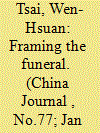

|
|
|
|
|
| Summary/Abstract |
Influenced by Confucian culture and Soviet traditions, the Chinese Communist Party (CCP) gives special attention to the arrangements for officials’ funerals. The format of these funerals is framed according to the officials’ rank and political performance. This article primarily discusses the funerals of national leaders and identifies five different roles: great leader, eminent leader, deposed leader, political offender, and political traitor. The leaders are given more stately funerals in accordance with how closely their performance in life is in accordance with the expectations of the Party. Through framing funerals, the leaders of the CCP seek to reinforce their personal political beliefs, as well as the ruling hegemony and legitimacy of the regime.
|
|
|
|
|
|
|
|
|
|
|
|
|
|
|
|
| 3 |
ID:
151714
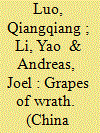

|
|
|
|
|
| Summary/Abstract |
In recent years the Chinese Communist Party has moved to scale up, modernize, and commercialize agriculture by placing it under the direction of large commercial enterprises known as dragonheads. Although scholars have drawn attention to the rapid advance of capitalist-style farming in China, there has been little investigation into how villagers have been pressed to cooperate with this endeavor. In this article, we examine methods used by local officials to create a grape production base for a large wine company in Xinjiang, which entailed getting all the peasant households in several townships—many of which were strongly opposed—to shift from cultivating rice and raising fish to growing grapes on contract. In this aggressive campaign, Party cadres and influential citizens were mobilized to persuade and coerce villagers, using an array of incentives and disincentives, to join what ultimately proved to be a very risky venture.
|
|
|
|
|
|
|
|
|
|
|
|
|
|
|
|
| 4 |
ID:
151717
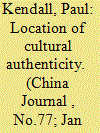

|
|
|
|
|
| Summary/Abstract |
This article examines notions of cultural identity and authenticity and how these notions are articulated in the small city of Kaili in Guizhou Province, an ethnically diverse region. Despite its urban status, Kaili has been branded by the local government as a yuanshengtai tourist destination. This Chinese term literally translates as “original ecology” but is used in ordinary conversation to denote a cultural authenticity in which people exist in quiet harmony with nature. Promotional literature uses the term to tout the ethnic cultural practices that mainly occur in the villages of Kaili’s municipal periphery. In contrast, many local urban inhabitants—although amenable to the promotion of Kaili as a tourist destination—have rejected the notion that the city itself could be considered culturally authentic, and proudly declare themselves “fake” ethnic minorities, as against the “genuine” ethnic people of surrounding villages. These small-city inhabitants have also defined themselves against big-city visitors by attributing to the visitors a naïve fascination with cultural authenticity, while themselves remaining aloof from such practices. The cultural authenticity discourse in Kaili has thus facilitated a reordering of social and spatial hierarchies, as blasé small-city residents define themselves against both culturally authentic rural people and authenticity-seeking big-city tourists. In analyzing this, the article draws out the broader implications regarding PRC notions of ethnicity, cultural practices, heritage, and identity.
|
|
|
|
|
|
|
|
|
|
|
|
|
|
|
|
| 5 |
ID:
151721
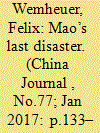

|
|
|
| 6 |
ID:
151719
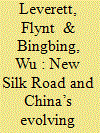

|
|
|
|
|
| Summary/Abstract |
The “new Silk Road” has emerged as the signature foreign policy initiative of Xi Jinping’s presidency and the main channel through which China is adapting its grand strategy to address daunting economic, environmental, and strategic challenges. In elite discourse, China’s “period of strategic opportunity” (zhànlüè jī yùqī 战略机遇期) is no longer defined mainly by other powers’ relatively benign postures. In this context, the new Silk Road offers unique insight into descriptions of Chinese foreign policy as becoming more fènfā yǒu wéi 奋发有为 (proactive, or self-achieving): China can increasingly leverage its own capabilities to enhance Chinese influence and secure Chinese interests by proactively encouraging greater regional and global multipolarity. While the West has long-term interests that would be well served by the new Silk Road’s success, this would also appreciably augment China’s strategic autonomy, ultimately compelling substantial adaptation in American grand strategy.
|
|
|
|
|
|
|
|
|
|
|
|
|
|
|
|
| 7 |
ID:
151716
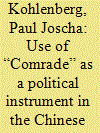

|
|
|
|
|
| Summary/Abstract |
The mandate that Chinese Communist Party (CCP) members should “address each other as comrades, not by official rank” (hu cheng tongzhi, bu yao jiao guanxian 互称同志, 不要叫官衔) as an expression of equality and shared values has been reemphasized by the Party leadership time and again. This article shows that relations within the Party are also sometimes deliberately fraught with tension, and as a result, the word “comrade” has been used during intra-Party conflicts with the aim of creating status uncertainty among cadre ranks. This strategic use of “comrade” emerges in purges, campaign politics, and anticorruption efforts. It allows the highest leaders to consolidate their power under the linguistic umbrella of solidarity and to inculcate doubt about personal loyalties among Party factions.
|
|
|
|
|
|
|
|
|
|
|
|
|
|
|
|
|
|
|
|
|